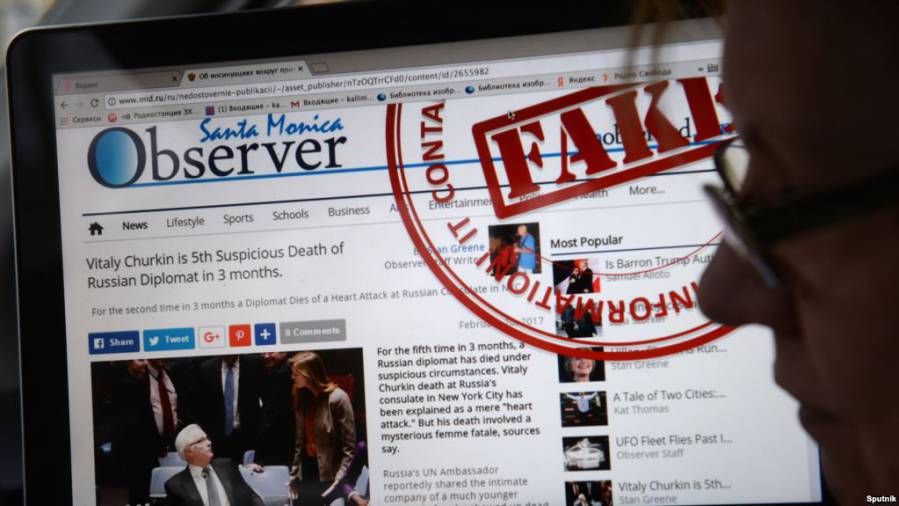Russia Launches New Project To Track ’Fake News’

The ministry has kept its debunking efforts to a minimum.
http://rferl.org/a/russia-project-fake-news-debunking/28325529.html
Russia has embraced the buzzword "fake news" to dismiss coverage it considers unfair or flat-out wrong -- even as Western governments accuse Moscow of exploiting false and misleading news for political gain.
Now it’s launched a project aimed at refuting reports it deems "false."
The Foreign Ministry this week unveiled a new section on its official website highlighting what it calls "examples of publications spreading false information about Russia."
So far, only five media outlets have landed in the ministry’s crosshairs: NBC News, The Telegraph, The New York Times, and Bloomberg. Even the significantly lower-profile Santa Monica Observer, a website in California, attracted the ministry’s scolding.
The ministry has kept its debunking efforts to a minimum.
In each instance, it provides a brief description of the subject matter and a one-sentence rejection that reads, "This material is used to spread information that does not correspond to reality."
Each entry also features a screenshot of the article in question decorated with a red stamp reading, "Fake."
All but one of the articles targeted by the ministry are based on either unidentified government sources or on public statements by political figures. At times, however, the Russian initiative appears to be shooting the messenger.
For example, the Bloomberg article centers on accusations by the campaign chief of Emmanuel Macron, a pro-European candidate in France’s presidential election, that Russian hackers are targeting the politician.
U.S. intelligence has concluded that Russia orchestrated a hack-and-leak campaign that aimed to help President Donald Trump win the White House election in November. It also assessed that the Kremlin deployed propaganda "to Russian and international audiences" as part of the campaign. Moscow denies the allegations.
The Bloomberg piece picked up the comments from France 2 Television, which has not been dinged by the ministry’s "Fake News" page. The Bloomberg story also includes a denial from Kremlin spokesman Dmitry Peskov.
The New York Times piece highlighted by the ministry alleges that "Russia has secretly deployed a new cruise missile that American officials say violates a landmark arms control meeting." The report cites a "senior official who did not provide further details and requested anonymity to discuss recent intelligence reports about the missile" and did not indicate that the paper sought comment from Russia.
Two days after that report, the Foreign Ministry issued a statement saying it remained in compliance with the treaty and accusing Washington of violating the accord.
The most tendentious article featured in the ministry’s "refutations" section is the February 22 piece published by the Santa Monica Observer. The article leans on theories by "conspiracists on Twitter" and posits that the death of Vitaly Churkin, Moscow’s envoy to the United Nations, this week came amid "suspicious circumstances."
There has been no suggestion from U.S. authorities that foul play may have been involved in Churkin’s death, reportedly due to a heart attack, in New York on February 20.
The Santa Monica site itself appears to have a history of publishing dubious, or patently false, news reports.
Foreign Ministry spokeswoman Maria Zakharova told reporters in Moscow on February 22 that Moscow was turning the tables on the West, where officials and media outlets have repeatedly accused Russia and Kremlin-loyal media of peddling falsehoods.
"Let’s swap the roles for a change -- then you’ll see for yourselves how tough it is to prove your case," Zakharova said.
The issue of "fake news" took on greater urgency during last year’s U.S. presidential election campaign.
Spurious reports alleging ballot-box stuffing, underground child-sex-trafficking rings, the pope’s endorsement of Trump, and other incredible stories dogged Democrat Hillary Clinton’s campaign, and led to an explosion of fact-checking news sites and other organizations trying to debunk rumors before they spread.
Some researchers have documented how social-media sites like Facebook allowed unverified news to circulate unchecked, with others concluding that it had a noticeable effect on voters’ opinions of candidates.
Since his inauguration on January 20, Trump himself has repeatedly dismissed critical media reports -- including those about alleged ties between his associates and Russia -- as "fake news."





